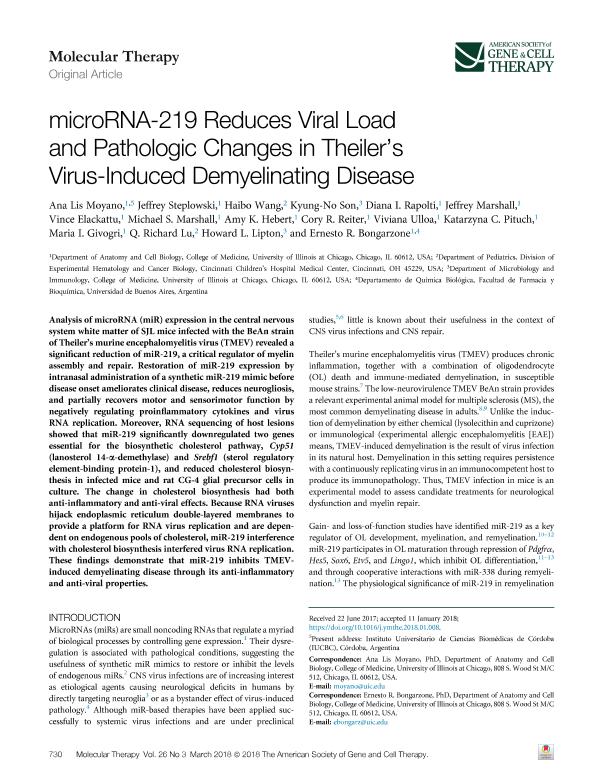Artículo
microRNA-219 Reduces Viral Load and Pathologic Changes in Theiler's Virus-Induced Demyelinating Disease
Moyano, Ana Lis ; Steplowski, Jeffrey; Wang, Haibo; Son, Kyung No; Rapolti, Diana I.; Marshall, Jeffrey; Elackattu, Vince; Marshall, Michael S.; Hebert, Amy K.; Reiter, Cory R.; Ulloa, Viviana; Pituch, Katarzyna C.; Givogri, Maria I.; Lu, Q. Richard; Lipton, Howard L.; Bongarzone, Ernesto R.
; Steplowski, Jeffrey; Wang, Haibo; Son, Kyung No; Rapolti, Diana I.; Marshall, Jeffrey; Elackattu, Vince; Marshall, Michael S.; Hebert, Amy K.; Reiter, Cory R.; Ulloa, Viviana; Pituch, Katarzyna C.; Givogri, Maria I.; Lu, Q. Richard; Lipton, Howard L.; Bongarzone, Ernesto R.
 ; Steplowski, Jeffrey; Wang, Haibo; Son, Kyung No; Rapolti, Diana I.; Marshall, Jeffrey; Elackattu, Vince; Marshall, Michael S.; Hebert, Amy K.; Reiter, Cory R.; Ulloa, Viviana; Pituch, Katarzyna C.; Givogri, Maria I.; Lu, Q. Richard; Lipton, Howard L.; Bongarzone, Ernesto R.
; Steplowski, Jeffrey; Wang, Haibo; Son, Kyung No; Rapolti, Diana I.; Marshall, Jeffrey; Elackattu, Vince; Marshall, Michael S.; Hebert, Amy K.; Reiter, Cory R.; Ulloa, Viviana; Pituch, Katarzyna C.; Givogri, Maria I.; Lu, Q. Richard; Lipton, Howard L.; Bongarzone, Ernesto R.
Fecha de publicación:
03/2018
Editorial:
Nature Publishing Group
Revista:
Molecular Therapy
ISSN:
1525-0016
e-ISSN:
1525-0024
Idioma:
Inglés
Tipo de recurso:
Artículo publicado
Clasificación temática:
Resumen
Analysis of microRNA (miR) expression in the central nervous system white matter of SJL mice infected with the BeAn strain of Theiler's murine encephalomyelitis virus (TMEV) revealed a significant reduction of miR-219, a critical regulator of myelin assembly and repair. Restoration of miR-219 expression by intranasal administration of a synthetic miR-219 mimic before disease onset ameliorates clinical disease, reduces neurogliosis, and partially recovers motor and sensorimotor function by negatively regulating proinflammatory cytokines and virus RNA replication. Moreover, RNA sequencing of host lesions showed that miR-219 significantly downregulated two genes essential for the biosynthetic cholesterol pathway, Cyp51 (lanosterol 14-α-demethylase) and Srebf1 (sterol regulatory element-binding protein-1), and reduced cholesterol biosynthesis in infected mice and rat CG-4 glial precursor cells in culture. The change in cholesterol biosynthesis had both anti-inflammatory and anti-viral effects. Because RNA viruses hijack endoplasmic reticulum double-layered membranes to provide a platform for RNA virus replication and are dependent on endogenous pools of cholesterol, miR-219 interference with cholesterol biosynthesis interfered virus RNA replication. These findings demonstrate that miR-219 inhibits TMEV-induced demyelinating disease through its anti-inflammatory and anti-viral properties. MicroRNAs (miRs) are small noncoding RNAs that regulate a myriad of biological processes by controlling gene expression. In the latest issue of Molecular Therapy, Moyano et al. show that intranasal delivery of miR-219 in a mouse model of viral demyelination reduces neurological burden and improves life quality through anti-inflammatory and anti-viral mechanisms.
Archivos asociados
Licencia
Identificadores
Colecciones
Articulos(CCT - CORDOBA)
Articulos de CTRO.CIENTIFICO TECNOL.CONICET - CORDOBA
Articulos de CTRO.CIENTIFICO TECNOL.CONICET - CORDOBA
Citación
Moyano, Ana Lis; Steplowski, Jeffrey; Wang, Haibo; Son, Kyung No; Rapolti, Diana I.; et al.; microRNA-219 Reduces Viral Load and Pathologic Changes in Theiler's Virus-Induced Demyelinating Disease; Nature Publishing Group; Molecular Therapy; 26; 3; 3-2018; 730-743
Compartir
Altmétricas



